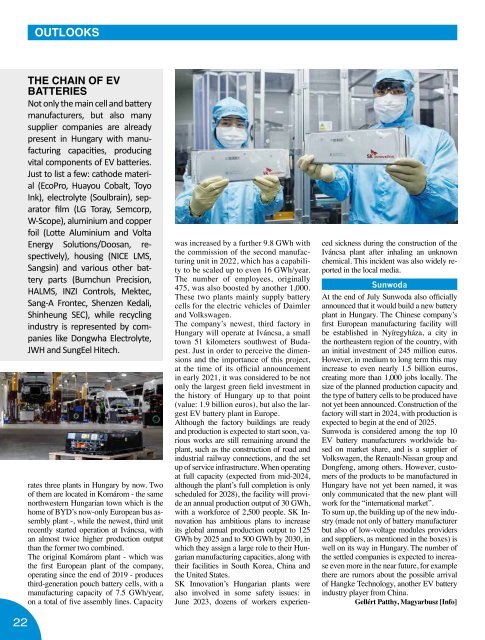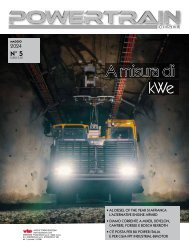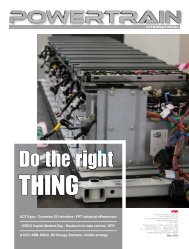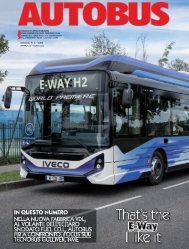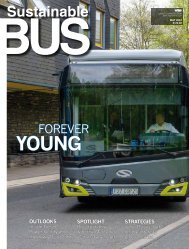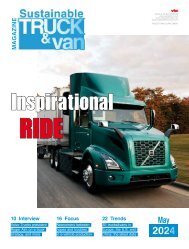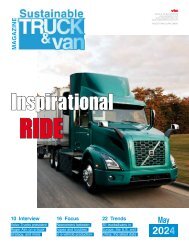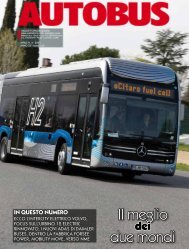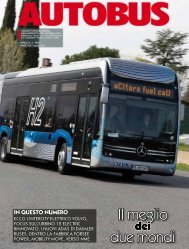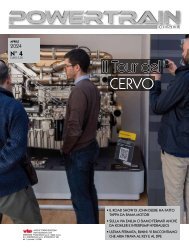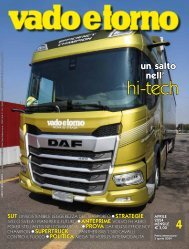2024-02 SUSTAINABLE BUS
In this issue, all the figures on the European e-bus market 2023 (hint: over 40 of the new city buses were electric!), a reporting on #battery manufacturing plans underway in Hungary and their impact on the European #electricbus landscape, a focus on powertrain values and strategies in the realm of e-mobility. Plus, a piece on the challenges faced by #BEV bus adoption in Germany (yes, it's also a matter of TCO).
In this issue, all the figures on the European e-bus market 2023 (hint: over 40 of the new city buses were electric!), a reporting on #battery manufacturing plans underway in Hungary and their impact on the European #electricbus landscape, a focus on powertrain values and strategies in the realm of e-mobility.
Plus, a piece on the challenges faced by #BEV bus adoption in Germany (yes, it's also a matter of TCO).
Create successful ePaper yourself
Turn your PDF publications into a flip-book with our unique Google optimized e-Paper software.
OUTLOOKS<br />
THE CHAIN OF EV<br />
BATTERIES<br />
Not only the main cell and battery<br />
manufacturers, but also many<br />
supplier companies are already<br />
present in Hungary with manufacturing<br />
capacities, producing<br />
vital components of EV batteries.<br />
Just to list a few: cathode material<br />
(EcoPro, Huayou Cobalt, Toyo<br />
Ink), electrolyte (Soulbrain), separator<br />
film (LG Toray, Semcorp,<br />
W-Scope), aluminium and copper<br />
foil (Lotte Aluminium and Volta<br />
Energy Solutions/Doosan, respectively),<br />
housing (NICE LMS,<br />
Sangsin) and various other battery<br />
parts (Bumchun Precision,<br />
HALMS, INZI Controls, Mektec,<br />
Sang-A Frontec, Shenzen Kedali,<br />
Shinheung SEC), while recycling<br />
industry is represented by companies<br />
like Dongwha Electrolyte,<br />
JWH and SungEel Hitech.<br />
rates three plants in Hungary by now. Two<br />
of them are located in Komárom - the same<br />
northwestern Hungarian town which is the<br />
home of BYD’s now-only European bus assembly<br />
plant -, while the newest, third unit<br />
recently started operation at Iváncsa, with<br />
an almost twice higher production output<br />
than the former two combined.<br />
The original Komárom plant - which was<br />
the first European plant of the company,<br />
operating since the end of 2019 - produces<br />
third-generation pouch battery cells, with a<br />
manufacturing capacity of 7.5 GWh/year,<br />
on a total of five assembly lines. Capacity<br />
was increased by a further 9.8 GWh with<br />
the commission of the second manufacturing<br />
unit in 2<strong>02</strong>2, which has a capability<br />
to be scaled up to even 16 GWh/year.<br />
The number of employees, originally<br />
475, was also boosted by another 1,000.<br />
These two plants mainly supply battery<br />
cells for the electric vehicles of Daimler<br />
and Volkswagen.<br />
The company’s newest, third factory in<br />
Hungary will operate at Iváncsa, a small<br />
town 51 kilometers southwest of Budapest.<br />
Just in order to perceive the dimensions<br />
and the importance of this project,<br />
at the time of its official announcement<br />
in early 2<strong>02</strong>1, it was considered to be not<br />
only the largest green field investment in<br />
the history of Hungary up to that point<br />
(value: 1.9 billion euros), but also the largest<br />
EV battery plant in Europe.<br />
Although the factory buildings are ready<br />
and production is expected to start soon, various<br />
works are still remaining around the<br />
plant, such as the construction of road and<br />
industrial railway connections, and the set<br />
up of service infrastructure. When operating<br />
at full capacity (expected from mid-<strong>2<strong>02</strong>4</strong>,<br />
although the plant’s full completion is only<br />
scheduled for 2<strong>02</strong>8), the facility will provide<br />
an annual production output of 30 GWh,<br />
with a workforce of 2,500 people. SK Innovation<br />
has ambitious plans to increase<br />
its global annual production output to 125<br />
GWh by 2<strong>02</strong>5 and to 500 GWh by 2030, in<br />
which they assign a large role to their Hungarian<br />
manufacturing capacities, along with<br />
their facilities in South Korea, China and<br />
the United States.<br />
SK Innovation’s Hungarian plants were<br />
also involved in some safety issues: in<br />
June 2<strong>02</strong>3, dozens of workers experien-<br />
ced sickness during the construction of the<br />
Iváncsa plant after inhaling an unknown<br />
chemical. This incident was also widely reported<br />
in the local media.<br />
Sunwoda<br />
At the end of July Sunwoda also officially<br />
announced that it would build a new battery<br />
plant in Hungary. The Chinese company’s<br />
first European manufacturing facility will<br />
be established in Nyíregyháza, a city in<br />
the northeastern region of the country, with<br />
an initial investment of 245 million euros.<br />
However, in medium to long term this may<br />
increase to even nearly 1.5 billion euros,<br />
creating more than 1,000 jobs locally. The<br />
size of the planned production capacity and<br />
the type of battery cells to be produced have<br />
not yet been announced. Construction of the<br />
factory will start in <strong>2<strong>02</strong>4</strong>, with production is<br />
expected to begin at the end of 2<strong>02</strong>5.<br />
Sunwoda is considered among the top 10<br />
EV battery manufacturers worldwide based<br />
on market share, and is a supplier of<br />
Volkswagen, the Renault-Nissan group and<br />
Dongfeng, among others. However, customers<br />
of the products to be manufactured in<br />
Hungary have not yet been named, it was<br />
only communicated that the new plant will<br />
work for the “international market”.<br />
To sum up, the building up of the new industry<br />
(made not only of battery manufacturer<br />
but also of low-voltage modules providers<br />
and suppliers, as mentioned in the boxes) is<br />
well on its way in Hungary. The number of<br />
the settled companies is expected to increase<br />
even more in the near future, for example<br />
there are rumors about the possible arrival<br />
of Hangke Technology, another EV battery<br />
industry player from China.<br />
Gellért Patthy, Magyarbusz [Info]<br />
Sustainable mobility of the future<br />
FOR A<br />
BETTER<br />
LIFE.<br />
22<br />
www.irizar-emobility.com


